by Arun Dahale
Every single drop of water should be used efficiently. Maharashtra is an Indian state particularly vulnerable to climate change and facing water scarcity, especially in rural areas. In 2016, Latur city ran out of water, and a special train had to be arranged to supply water for drinking. In the summer season, most of the rural population is dependent on tanker for drinking water. The farm ponds are filled not by surface runoff as they are meant to, but by groundwater. The number of dug-wells and bore-wells are increasing drastically. A huge amount of water is used for water-intensive cash crops. Out of the total 1531 watersheds, 76 watersheds are categorized as overexploited (GSDA, 2014). Improper management of surface as well groundwater resource is the overall situation we observe. Maharashtra has a rich history of watershed development, and the state is a pioneer in policy interventions in the water sector. However, in the absence of effective water governance on the ground and demand-side water management, the situation is getting worse.
In response to these challenges, Watershed Organisation Trust (WOTR) launched the Water Stewardship initiative (WSI) to promote and implement climate-smart water governance in semi-arid regions. This has helped in the efficient use of water that is socially equitable, environmentally sustainable, and economically efficient. In contrast, demand side water management is more focused than the supply side. Since 2016, WOTR is implementing WSI in many regions with the support of different donor agencies and making required changes in this approach with new learnings to make the approach more robust.
Presently with the support of CAF-India, WSI is being implemented in 41 villages in two regions of Jalna and Ahmednagar district in Maharashtra. Several stakeholder engagement workshops, aquifer level workshops and training on organic farming are conducted in project villages. Where Village Water Management Team (VWMT) are trained to prepare Stewardship Plans (Water Health Chart, Water Budget, Water Harvesting and Water Use efficiency plan) during these workshops. VWMT members took forward the process for the implementation of these plans at the village level. Water budgeting, participatory aquifer management, promotion of vermicompost for improving soil fertility, enhancing water holding capacity, repair and maintaining existing water harvesting structures, and promoting micro-irrigation systems for efficient use of water are few key components of this initiative.
All these efforts resulted in institutional building, in demand-side water management as well as awareness among the villagers on water issues. Of course, all villagers do not perform at the same level; therefore an incentive action and motivation mechanisms are adopted to appreciate villages for the good work they are doing. This recognises, ‘only when your efforts are applaudable, your work will be laudable!’ WOTR took this opportunity to appreciate the performance of VWMT with Villagers and award best performing village during March 2021. To applaud and motivate villagers for good water governance is the main objective of this assessment. We evaluated each village out of the 41 villages where WSI is being implemented under the CAF-India support.
Evaluation through peer group for assessment
One member from each project villages was selected in the peer-group for assessment. Then this peer team trained for the assessment of the water stewardship project. The assessment of the project is done across the four major components of water management, i.e, a) governance and institutions, b) supply-side management, c) demand-side management, d) and equity and sustainability. Implementation of the water budget and water use efficiency were also focused in the assessment process. The peer group teams were well trained for conducting the evaluations.
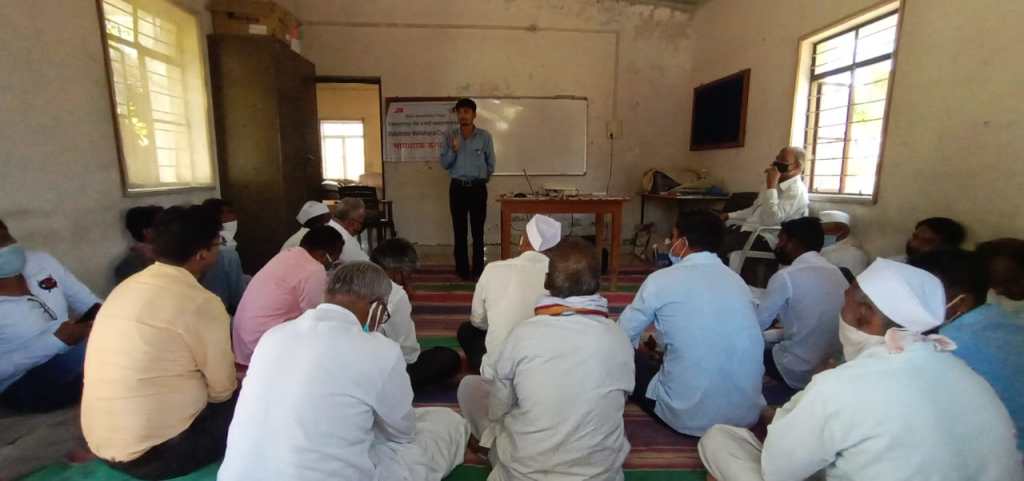
Assessment of villages
The participatory peer group assessment took place where members of VWMT participated in evaluating the water management practices in villages of each other. Members of Grampanchayat and members of various CBO’s actively participated during the assessment process. The relevant village level documents, such as proceeding of meetings, rainfall records, water stewardship plans, Grampanchayat resolution of presentation of the water budget in Gramsabha, Gramsabha proceeding etc. have been checked by assessment teams.
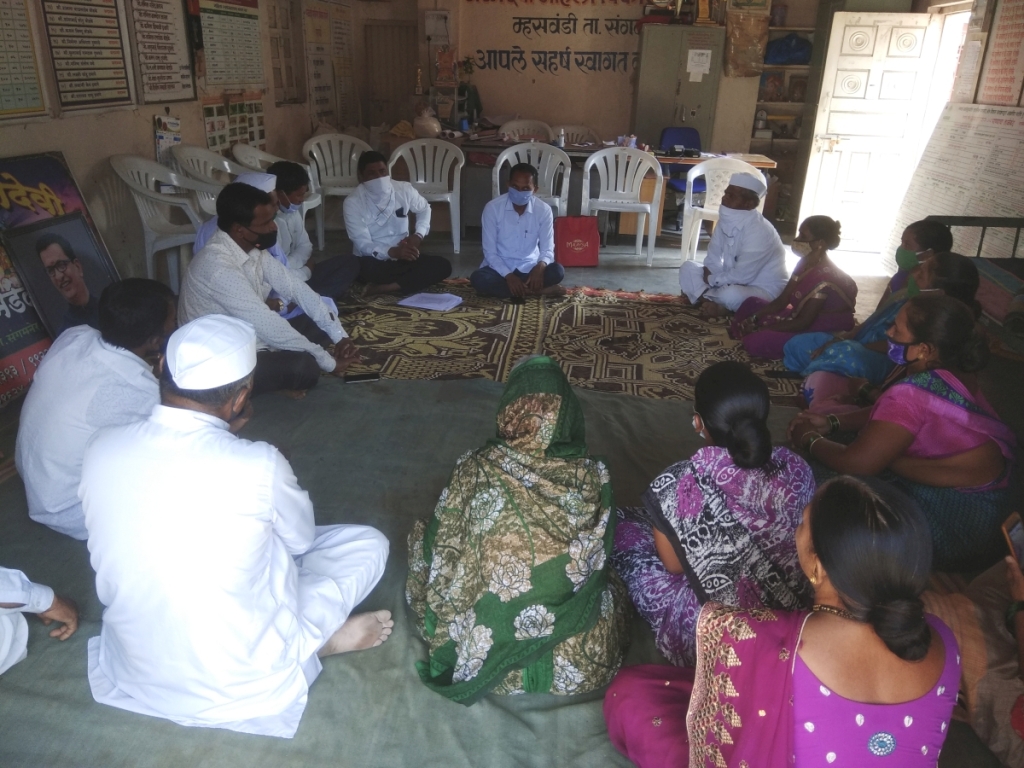
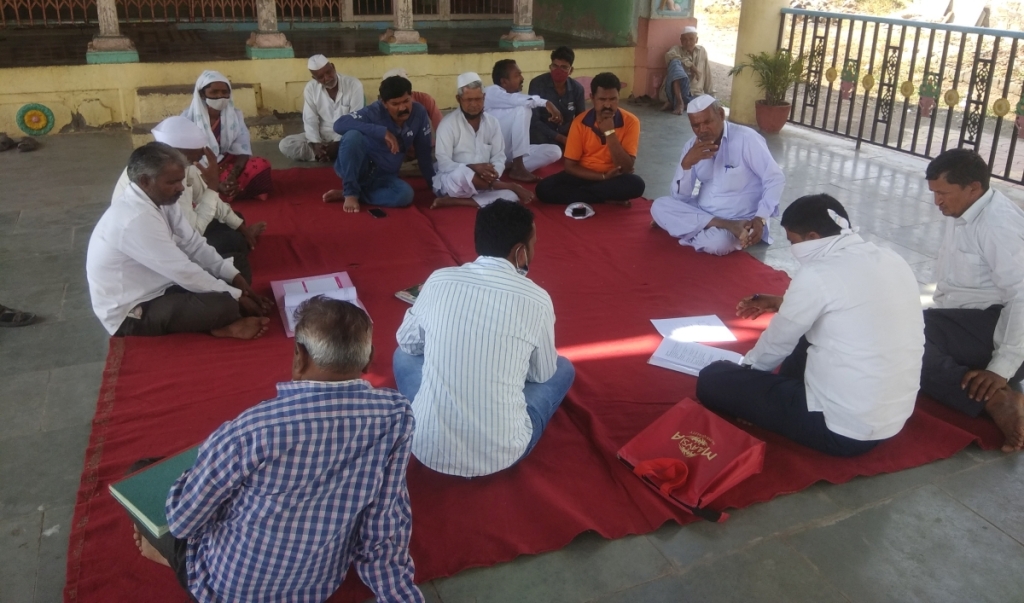
Award Ceremony
The award ceremony for the Sangamner region was planned on the occasion of World Water day (22 March) and on 23 March 2021 for the Jalna region. VWMT representatives from each project village were invited.. After the formal opening of the ceremony, Dr Eshwer Kale virtually delivered the inaugural speech, appreciated VWMT’s good work, motivated participants to take forward the practices of demand-side management through water budgeting, setting norms for water use even after the project completion. . After the inaugural speech, the winning villages were awarded, and then the selected VWMT members from few villages shared their experiences.
| Award winning villages | ||
| Level of award | Sangamner region | Jalna region |
| First award | Mhaswanndi | Kolegaon |
| Second award | Bhojdari | Kotha Jahagir |
| Third award | Satichiwadi | Gavhan Sangamneshwar |
Experience sharing
Gokul Ugale, VWMT member Kumbharwadi.
Stakeholder workshop and aquifer level workshop were beneficial for us to understand the importance of Water budgeting tool for effective water management. We accumulated knowledge through various trainings and now can prepare water budget for our village. Now we collect rainfall data in our village and record it to prepare the water budget for Rabi season. This knowledge will be helpfulin future for effective water management in our village. .
Bhagwat Gagare, VWMT
It was a great experience to evaluate, observe other project villages during the peer assessment process. When we assessed each other’s village regarding water management, we realised the need to improve the level of water management in our villages. Some villages made great efforts for good water governance, water harvesting, and crop planning in their villages; however, we need to use a single drop of water most efficiently. During this project, we also realised that the perception of water as a private resource has to be changed, and it has to be seen as a collective resource, therefore water budgeting in villages and rules of water use is essential.
Mr.Kisan Icche, Aquifer Management Team
Not only surface water but groundwater management is also very crucial in today’s scenario. Groundwater is the primary source to fulfil agriculture and drinking water needs. It is time to understand the common aquifer and collective plan for its management. 3D Aquifer model is playing a vital role to understand the scenario of the aquifer at our village. Until and unless we do not make norm and crop planning without understanding groundwater table, we will not be able to use water resources in a sustainable manner.
Mrs.Lilabai Sonune, Godri, Bhokardan
I got an opportunity to spread awareness on aquifer level water management through the CDVI model. We came to know the severity of water crisis and understood the importance of people’s participation in groundwater management. We developed our perception toward the conservation of water resources for our next generation. Training under the project helped us water budgeting base crop management. I saw the changes regarding water management in project villages during a demonstration of the CDVI model, and that motivates me to take forward it in my village.
Mr.Waman Bhau Jadhav, VWMT Satichiwdi
We are very grateful for WOTR’s intervention in water management in our village.The exploitation of groundwater resource and climate change, is a huge challenge in the water sector. Water budget is an important tool for making village water secure with prosperity. Today’s appreciation will make us more responsible for water governance in a good manner. However, we as VWMT will do our best to keep our village prosperous in water management and try to be the ideal best water manager.
Mrs Ahilya Tai Ghule Sarpanch Sarole Pathar
I attend many trainings conducted under the project. I realised ib one of these training which was held at Mhaswandi thatall the participants prepared their village water budget during the training. It was very interesting that during this exercise, we reserved some amount of water for drinking purpose and plan for agriculture use with available water. Before knowing the water budget, we only keep budgeting for money. But this budget was made for water. Before this, none of us could count the amount of water we get from rain and how to plan. The intervention of WOTR’s WSI, is very significant, which gives clear guidelines to make village tanker free and self-sustainable with water literacy at village level.
Dilip Satkar, VWMT member Mhaswandi
Shramadan was the key principle of the Watershed Development Program. It helps to build ownership of watershed work, motivating us to follow the rules for soil and water conservation. For best water management, we made some rules such as a ban on direct pumping from water harvesting structures, ban on water-guzzling crops, a ban on borewells, etc. Our villager realises that we made efforts for water availability through watershed development work. So efficient use of it is our responsibilty.Outsiders from many villages come to our village to see the impact of Watershed Development and women empowerment through SHGs. Our SHGs actively participate to prepare a water budget for the village and motivating farmers towards efficient use of even a single drop of water. This award is making us more responsible and motivating VWMT members, SHG members and villagers.
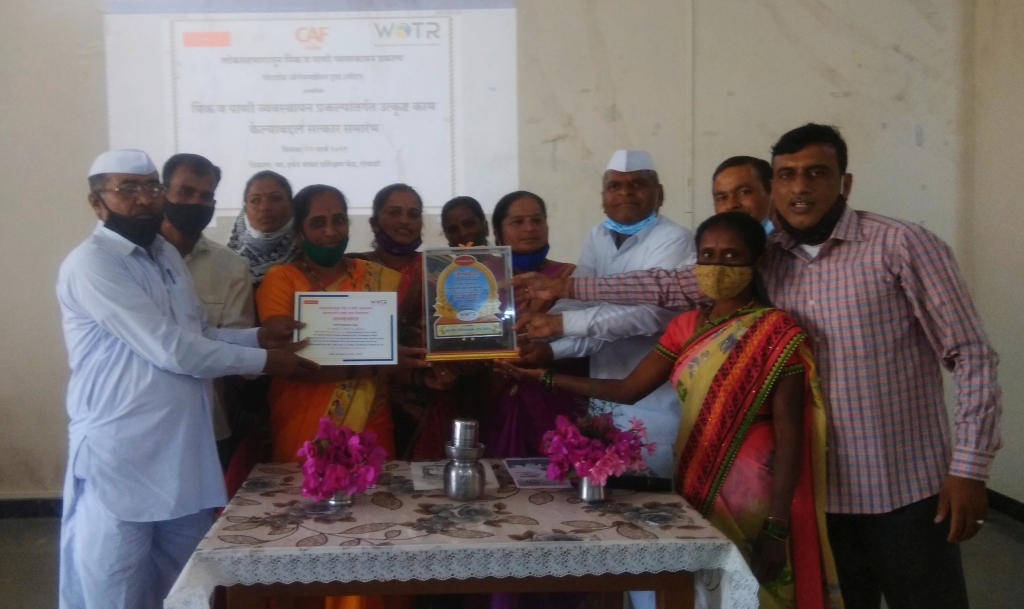


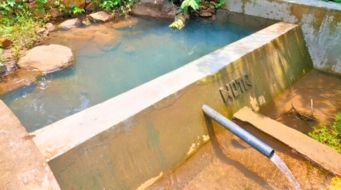
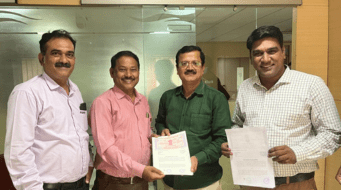



1 thought on “Water Stewards – Champions of good water governance”
Nice blog